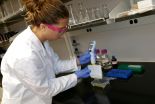(Press-News.org) DENVER, March 23, 2015 -- More than a year into Colorado's experiment legalizing marijuana, labs testing the plants are able for the first time to take stock of the drug's potency and contaminants -- and openly paint a picture of what's in today's weed. At the 249th National Meeting & Exposition of the American Chemical Society (ACS), one such lab will present trends -- and some surprises -- that its preliminary testing has revealed about the marijuana now on the market.
ACS, the world's largest scientific society, is holding the meeting here through Thursday. It features nearly 11,000 presentations on a wide range of science topics. A brand-new video on the research is available at http://bit.ly/MarijuanaTestingACS.
Three major patterns have emerged over the past few months since Andy LaFrate, Ph.D., and his lab began testing marijuana samples. Those patterns concern potency, amounts of a substance called CBD and contaminants in the products.
"As far as potency goes, it's been surprising how strong a lot of the marijuana is," LaFrate says. "We've seen potency values close to 30 percent THC, which is huge." LaFrate is the president and director of research of Charas Scientific, one of eight labs certified by Colorado to do potency testing.
THC is an abbreviation for tetrahydrocannabinol, which is the psychoactive compound in the plant. He explains that three decades ago, THC levels were well below 10 percent. Its content has tripled in some strains because producers have been cross-breeding them over the years to meet user demands for higher potency, he says.
But an unexpected consequence of this breeding has occurred, says LaFrate. Many of the samples his lab has tested have little to no cannabidiol, or CBD. CBD is a lesser known compound in marijuana that is of increasing interest to medical marijuana proponents. Researchers are investigating CBD as a treatment for schizophrenia, Huntington's disease and Alzheimer's disease. It is also being considered for anxiety and depression. But unlike THC, CBD doesn't get people high -- that's a key trait for many people who are wary of buzz-inducing drugs and for potential medical treatments for children. As for recreational users, the lack of CBD in marijuana means that many of the hundreds of strains they select from could in actuality be very similar chemically, according to LaFrate.
"There's a lot of homogeneity whether you're talking medical or retail level," he says. "One plant might have green leaves and another purple, and the absolute amount of cannabinoids might change, which relates to strength. But the ratio of THC to CBD to other cannabinoids isn't changing a whole lot." That means there might be little difference in how the varieties make you feel, even though some people claim one kind will make you mellow and another will make you alert, LaFrate explains.
As for contamination testing, although Colorado doesn't yet require it, some producers have voluntarily submitted samples to see what's in their products. LaFrate says the results have been surprising. His lab looks for both biological and chemical contaminants, such as pathogenic microbes and solvents.
"It's pretty startling just how dirty a lot of this stuff is," he says. "You'll see a marijuana bud that looks beautiful. And then we run it through a biological assay, and we see that it's covered in fungi."
The lab also finds varying levels of chemical contaminants such as butane, which is used to create marijuana extracts. Contamination isn't necessarily a cause for alarm, but it does signal a need to figure out what levels are safe.
"It's a natural product," LaFrate says. "There's going to be microbial growth on it no matter what you do. So the questions become: What's a safe threshold? And which contaminants do we need to be concerned about?"
In other words, legalizing marijuana has raised a lot of issues that still have to be hammered out. LaFrate, who has been involved with the policy side of Colorado's new marijuana market, as well as the laboratory side, says he expects regulations will continue to evolve as scientists, lawmakers and others learn more about the plant and its products.
A press conference on this topic will be held Monday, March 23, at 2 p.m. Mountain time in the Colorado Convention Center. Reporters may check-in at Room 104 in person, or watch live on YouTube http://bit.ly/ACSLiveDenver. To ask questions, sign in with a Google account.
INFORMATION:
The American Chemical Society is a nonprofit organization chartered by the U.S. Congress. With more than 158,000 members, ACS is the world's largest scientific society and a global leader in providing access to chemistry-related research through its multiple databases, peer-reviewed journals and scientific conferences. Its main offices are in Washington, D.C., and Columbus, Ohio.
To automatically receive news releases from the American Chemical Society, contact newsroom@acs.org.
Note to journalists: Please report that this research is being presented at a meeting of the American Chemical Society.
Follow us: Twitter | Facebook
Title
State mandated testing of retail marijuana in Colorado
Abstract
In 2012, Colorado voters approved Amendment 64 which legalized the sale of recreational marijuana to adults age 21 and over. Written into the amendment were provisions that require all products to be tested for cannabinoid potency and contaminants prior to sale. The Marijuana Enforcement Division (MED) within the State's Department of Revenue had been regulating medical marijuana for years and was tasked with setting rules for the mandatory testing program. This presentation will summarize marijuana testing rules in Colorado, methods used for testing and an overview of test results for recreational marijuana. The law requires every "batch" to be tested for several different chemical and biological entities and the rules are quite complex. Methods such as high performance liquid chromatography (HPLC), gas chromatography (GC), mass spectrometry (LCMS), microbial culture and real time polymerase chain reaction (PCR) are utilized in testing. The results obtained are both fascinating and shocking and offer a scientific glimpse at an industry in its infancy.
Researchers from the University of Copenhagen are the first in the world to develop a secure way of measuring the important protein apo-M. This could prove relevant for research into diseases such as diabetes, arteriosclerosis and sclerosis.
For the first time, researchers from the University of Copenhagen have managed to develop a secure way of measuring the protein apo-M in our blood. The protein is interesting because it may prove important to research into diseases such as multiple sclerosis, arteriosclerosis and diabetes.
'We know that apo-M is of importance to ...
States that have expanded their Medicaid programs under the Affordable Care Act (ACA) are capturing an increased number of people with previously undiagnosed diabetes, allowing them to begin treatment earlier, potentially reducing complications and other negative outcomes, according to a study being published online today and in the May issue of Diabetes Care.
The release of the study coincides with the 5th anniversary of the ACA, which expanded Medicaid eligibility to reach nearly all non-elderly adults with incomes at or below 138 percent of the federal poverty level ...
Coral Gables, Fla. (March 23, 2015) - A new study shows that providing women with skills to manage stress early in their breast cancer treatment can improve their mood and quality of life many years later. Published early online in CANCER, a peer-reviewed journal of the American Cancer Society, the findings suggest that women given the opportunity to learn stress management techniques during treatment may benefit well into survivorship.
At the turn of the century, 240 women with a recent breast cancer diagnosis participated in a randomized trial that tested the effects ...
Scientists have found that genetic changes in bowel tumours are linked to the way the body's immune system responds to the cancer, according to research published today (Monday) in the journal Oncoimmunology*.
For the first time, Cancer Research UK researchers at the University of Birmingham have found that certain genetic flaws in bowel cancer are more likely to trigger an immune response at the site of tumours, meaning that treatments to boost this immune response further could potentially be helpful for these patients.
Finding out what's happening in a cancer patient's ...
Climate change could accelerate the emergence of vector-borne diseases such as chikungunya, dengue fever, and West Nile virus in the UK, warn leading public health experts Dr Jolyon Medlock and Professor Steve Leach from the Emergency Response Department at Public Health England, writing in The Lancet Infectious Diseases journal.
Findings from the Review indicate that vector-borne diseases, which are transmitted by insects such as mosquitoes and ticks, are on the rise and have spread into new territories across Europe over the past decade (eg, malaria in Greece, West ...
A new study by researchers at Brigham and Women's Hospital (BWH) has found that for young, healthy women taking spironolactone to treat hormonal acne, frequent office visits and blood draws are an unnecessary health care expense. For the approximately 1,000 patients studied, blood tests to monitor potassium levels did not change the course of treatment, but the tests cumulatively totaled up to $80,000. The research team suggests that routine potassium monitoring should no longer be recommended for this patient population in order to improve the patient care experience, ...
DENVER, March 22, 2015 -- Taking vitamin D supplements could slow or even reverse the progression of less aggressive, or low-grade, prostate tumors without the need for surgery or radiation, a scientist will report today.
His team will describe the approach in one of nearly 11,000 presentations at the 249th National Meeting & Exposition of the American Chemical Society (ACS), the world's largest scientific society. The meeting is being held here through Thursday.
If a tumor is present in a prostate biopsy, a pathologist grades its aggressiveness on a scale known as ...
DENVER, March 22, 2015 -- Scientists will report in a presentation today that they have turned to the opossum to develop a promising new and inexpensive antidote for poisonous snake bites. They predict it could save thousands of lives worldwide without the side effects of current treatments.
The presentation will take place here at the 249th National Meeting & Exposition of the American Chemical Society (ACS), the world's largest scientific society. The meeting features nearly 11,000 reports on new advances in science and other topics. It is being held through Thursday.
Worldwide, ...
DENVER, March 22, 2015 -- Construction crews may someday use a plant molecule called lignin in their asphalt and sealant mixtures to help roads and roofs hold up better under various weather conditions. It also could make them more environmentally friendly, according to a researcher today at the 249th National Meeting & Exposition of the American Chemical Society (ACS).
The meeting, attended by thousands of scientists, features nearly 11,000 reports on new advances in science and other topics. It is being held here through Thursday.
Currently, a by-product of crude ...
DENVER, March 22, 2015 -- Chlorine, a disinfectant commonly used in most wastewater treatment plants, may be failing to completely eliminate pharmaceuticals from wastes. As a result, trace levels of these substances get discharged from the plants to the nation's waterways. And now, scientists are reporting preliminary studies that show chlorine treatment may encourage the formation of new, unknown antibiotics that could also enter the environment, potentially contributing to the growing problem of antibiotic resistance.
The research, which will be presented today at ...

